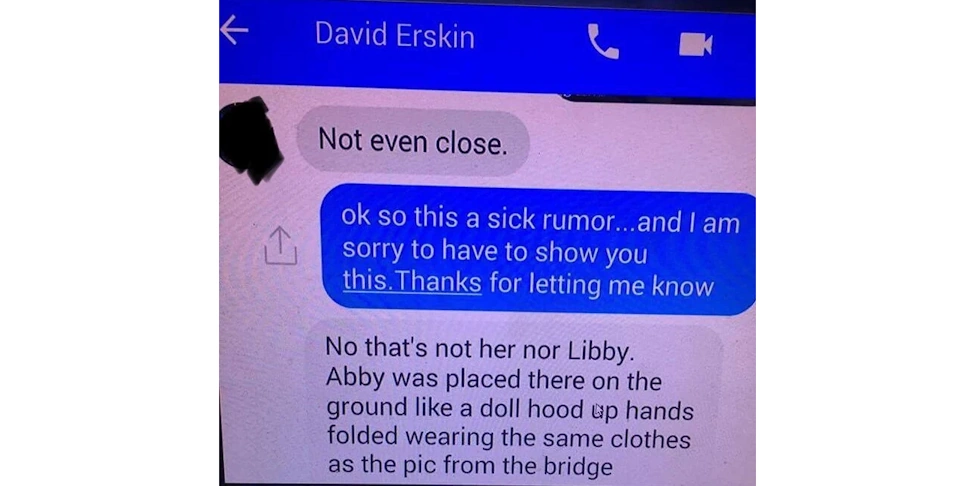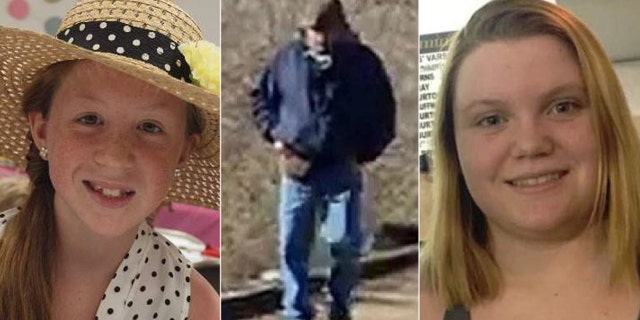Arrest Made in Delphi, Indiana Double Murders Case for Leak of Crime Scene Photographs

New filings have been made in the Delphi double murders case, with authorities arresting and charging Mitch Westerman for the unauthorized distribution of crucial crime scene evidence. Westerman, a former coffee drinking buddy of his former boss, defense attorney Andrew Baldwin, admitted to taking photographs of crime scene pictures with his cell phone. Investigators […]
Delphi Leaked Texts Controversy Surrounding the Shocking 2017 Murders

Indiana police are currently investigating leaked crime scene images from the notorious 2017 Delphi murders. The pictures have been circulated through text, email, and various social media platforms, generating widespread concern. Libby German, 14, and Abby Williams, 13, were tragically killed while hiking on Indiana’s Delphi Historic Trails on February 13, 2017. Their bodies […]
Attorneys for Richard Allen, Delphi Murder Suspect, Unexpectedly Withdraw from Case

Special Judge Fran Gull announced on Thursday that attorneys representing the Delphi murder suspect, Richard Allen, have withdrawn from the case. Allen is facing charges for the February 2017 murders of Abby Williams and Libby German near Delphi’s Monon High Bridge. Scheduled for a 2 p.m. appearance in the Allen County court on Thursday, […]
Mysterious Prison Transfer: Delphi Murder Suspect Relocated to High-Security Facility Amidst Controversy

In a shocking turn of events, the Indiana Department of Correction has discreetly moved the prime suspect in the infamous Delphi murder case, Richard Allen, to a new prison facility. The state recently filed a notice with the court, revealing that Allen has been transferred to the highly secure Wabash Valley Facility, located south […]
Delphi Murders Case: Judge Gull Faces Crucial Deadline Amid Legal Challenges and Health Concerns

Allen County Superior Judge Fran Gull, appointed to preside over the trial of Richard Allen, the suspect in the 2017 Delphi murders, confronts a significant deadline the Monday following Thanksgiving. In late October, Allen’s attorneys requested the Indiana Supreme Court to remove Judge Gull from the case, citing potential violations of Allen’s constitutional rights […]
Judge’s Hospitalization Raises Questions in Delphi, Indiana Double Murders Case

Judge Frankel, who is overseeing the Delphi double murders case involving Richard Allen, has been in and out of the hospital for several weeks. This development has raised questions about whether she should continue presiding over the high-profile case. Court officials have confirmed that Judge Frankel was hospitalized on November 2nd due to an […]
Judge in Delphi Murders Case Faces Allegations of Withholding Case Records

Judge Francis Gull, presiding over the Delphi murders case, is defending herself against allegations that she improperly withheld important case records from the public. Attorneys for Richard Allen, the defendant in the case, have filed a 20-page response to the Indiana Supreme Court, claiming that Judge Gull has not released over 100 court documents […]
Twist of Fate: New Charges Filed in Infamous Delphi Murders Case

The long-awaited trial for the heinous Delphi murders has taken an unexpected twist. Prosecutors in Indiana have filed new charges, including murder, against the prime suspect, Richard Matthew Allen. The accused killer, who allegedly took the lives of 14-year-old Libby German and 13-year-old Abby Williams during a fateful hike near their hometown in 2017, […]
Indiana Supreme Court Urged to Reject Petition for Removal of Judge in Delphi Murders Trial

In the ongoing legal proceedings of the Delphi murders trial, Judge Fran Gull and Indiana Attorney General Todd Rokita have urged the Indiana Supreme Court to dismiss a petition seeking Gull’s removal from the case. The petition, a writ of mandamus, also calls for the reinstatement of Richard Allen’s original defense team, Bradley Rozzi […]
Potential Leak of Text and Phone Records Threatens 2024 Trial in Delphi Murder Case

A potential evidence leak concerning the 2017 murders of Abby Williams and Libby German in Delphi, Indiana could complicate the 2024 trial of accused killer, Richard Allen. This development, as uncovered by “The Murder Sheet” podcast and subsequently confirmed by FOX59, revolves around the alleged dissemination of sensitive crime scene details on social media. […]
